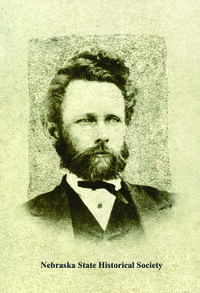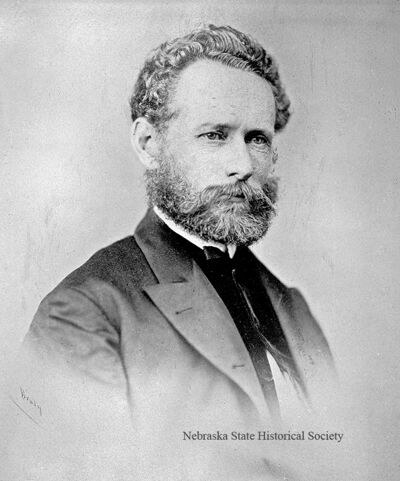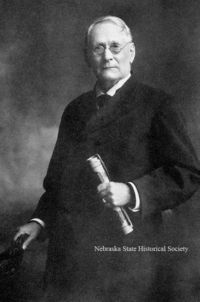Difference between revisions of "Thomas Perkins Kennard (1828-1920)"
(→Early Life) |
(→Bibliography) |
||
| (15 intermediate revisions by 2 users not shown) | |||
| Line 1: | Line 1: | ||
{| | {| | ||
| − | |[[File:RG2411-2874d_SFN106521_41w.jpg|thumb|center|upright=1. | + | |[[File:RG2411-2874d_SFN106521_41w.jpg|thumb|center|upright=1.0|alt=RG2411-2874d_SFN106521_41w.jpg|Thomas P. Kennard, ca. 1860 (''Nebraska State Historical Society'')]] |
| − | |[[File:RG2411-2874_SFN16329_3_1w.jpg|thumb|center|upright=2. | + | |[[File:RG2411-2874_SFN16329_3_1w.jpg|thumb|center|upright=2.0|alt=File:RG2411-2874_SFN16329_3_1w.jpg|Thomas P. Kennard, ca. 1870 (''Nebraska State Historical Society'')]] |
| − | |[[File:ElderKennard_2w.jpg|thumb|center|upright=1. | + | |[[File:ElderKennard_2w.jpg|thumb|center|upright=1.0|alt=File:ElderKennard_2w.jpg|Thomas P. Kennard, ca. 1916 (''Nebraska State Historical Society'')]] |
|} | |} | ||
| − | Thomas Perkins Kennard (1828-1920) was a prominent Republican politician in the early days of Nebraska. He was a member of the commission that selected the village of Lancaster, renamed Lincoln, as the capital of Nebraska. As one of the city's earliest and most influential residents, he is often called the "Father of Lincoln." '''[[Thomas P. Kennard House|His original house in Lincoln]]''' still stands today, restored as the '''[[Nebraska Historical Marker: Nebraska Statehood Memorial|Nebraska Statehood Memorial]]''' and a '''[http://www.nebraskahistory.org/sites/kennard/ museum of the Nebraska State Historical Society]'''. | + | <div style="white-space:wrap;font-size:115%">Thomas Perkins Kennard (1828-1920) was a prominent Republican politician in the early days of Nebraska. He was a member of the commission that selected the village of Lancaster, renamed Lincoln, as the capital of Nebraska. As one of the city's earliest and most influential residents, he is often called the "Father of Lincoln." '''[[Thomas P. Kennard House, 1869, Lincoln|His original house in Lincoln]]''' still stands today, restored as the '''[[Nebraska Historical Marker: Nebraska Statehood Memorial|Nebraska Statehood Memorial]]''' and a '''[http://www.nebraskahistory.org/sites/kennard/ museum of the Nebraska State Historical Society]'''.</div style="white-space:wrap;font-size:115%"> |
==Early Life== | ==Early Life== | ||
| − | Born in Ohio on December 13, 1828, to English Quakers,Thomas Perkins Kennard is known as the Father of Lincoln, Nebraska. His family were Quakers | + | Born in Ohio on December 13, 1828, to English Quakers,Thomas Perkins Kennard is known as the Father of Lincoln, Nebraska. His family were Quakers; perhaps, generations back, emigrating on the same boat as William Penn, and first lived in Pennsylvania. His father, Thomas Sr., moved the family to Ohio in 1814. Thomas P. was born to Thomas Sr.’s second wife, Elisabeth. The Kennards moved to Indiana when Thomas P. was young. Typical of farmers at the time, the younger Thomas received little schooling; he claimed but one year of formal education by the time he reached age 16. He found himself ill suited to farming and instead apprenticed at a woolen mill. In the 1850s, he decided to become a lawyer, and married a non-Quaker. For both choices he was separated from the Quakers, but his Quaker beliefs continued to influence his whole life. |
| − | Kennard completed his legal training and worked in both Greensboro and Anderson, Indiana. Firm abolitionist convictions drew him to the Republican Party, he soon became involved in the early Party in Indiana. | + | Kennard completed his legal training and worked in both Greensboro and Anderson, Indiana. Firm abolitionist convictions drew him to the Republican Party, and he soon became involved in the early Party in Indiana. |
| − | Two of his brothers came to Nebraska in 1856 and Thomas joined them in 1857, residing in De Soto, a settlement north of Omaha near modern-day Blair. Thomas and his brother Levi began a successful land agency, allowing his family to join him at De Soto in 1858. In addition to helping with the land agency, Thomas practiced law and ran a hotel. | + | Two of his brothers came to Nebraska in 1856 and Thomas joined them in 1857, residing in De Soto, a burgeoning Missouri River settlement north of Omaha near modern-day Blair. Thomas and his brother Levi began a successful land agency, allowing him to return to Ohio and bring his family to join him at De Soto in 1858. In addition to helping with the land agency, Thomas practiced law and ran a hotel. |
As he had in Indiana, Kennard was involved in Republican politics. In addition to abolitionism, he supported women’s suffrage and opposed the death penalty. He was elected to several local positions, including mayor of De Soto. | As he had in Indiana, Kennard was involved in Republican politics. In addition to abolitionism, he supported women’s suffrage and opposed the death penalty. He was elected to several local positions, including mayor of De Soto. | ||
| Line 24: | Line 24: | ||
'''[[Nebraska Historical Marker: Nebraska Statehood Memorial|Nebraska’s statehood became official on March 1, 1867]]'''. David Butler became governor on March 27th. As secretary of state, Kennard had the second highest position in state government. He was in charge of handling official documents and ensuring that all necessary supplies were in order during legislative sessions. | '''[[Nebraska Historical Marker: Nebraska Statehood Memorial|Nebraska’s statehood became official on March 1, 1867]]'''. David Butler became governor on March 27th. As secretary of state, Kennard had the second highest position in state government. He was in charge of handling official documents and ensuring that all necessary supplies were in order during legislative sessions. | ||
| − | ==Capital | + | ==Capital Relocation== |
| − | Omaha | + | Omaha served as capital of the Nebraska Territory since 1854, when Territorial Governor Thomas Cuming selected it. The location became a bone of contention after Nebraska became a state because more people lived south of the Platte than north, but the north part of the state had more representation in the territorial legislature[?]. Those living in the southeastern part of the state obviously wanted to move the capital to a location south of the Platte. |
| − | On June 14, 1867, | + | On June 14, 1867, the state legislature created a commission to select the site of a new capital. Governor David Butler, State Auditor John Gillespie and Kennard were selected as the commissioners. They were instructed to pick a site in Seward County, the southern portions of Saunders and Butler Counties, or in the northern part of Lancaster County. Whatever site they chose would be renamed “Lincoln,” in honor of the martyred president. Omaha Republicans passed that resolution hoping Democrats, lacking affection for President Lincoln, would choose not to have the capital in the southern part of the state if it bore that name. Their scheme did not work. |
| − | + | Touring the areas designated by the bill, the commissioners chose the village of Lancaster, in Lancaster County, to be the new state capital on August 14, 1867. (Ashland was Gillespie’s choice, but he later joined Butler and Kennard in choosing Lancaster.) At the time, Lancaster was geographically central to the southeastern Nebraska population, and was near to the salt flats that commissioners thought could one day be economically profitable. | |
| − | To instill confidence in the new town of Lincoln, Kennard and the other commissioners built expensive houses within or near the original plat of the capital. '''[[Thomas P. Kennard House|Kennard’s house stands to this day]]'''. | + | To instill confidence in the new town of Lincoln, Kennard and the other commissioners built expensive houses within or near the original plat of the capital. '''[[Thomas P. Kennard House, 1869, Lincoln|Kennard’s house stands to this day]]'''. |
==Kennard's Later Years== | ==Kennard's Later Years== | ||
| − | Kennard chose not to run for reelection in 1870. | + | Kennard chose not to run for reelection in 1870. The following year charges were leveled at Governor Butler and State Auditor Gillespie that led to impeachment proceedings. Butler was impeached, Gillespie was not. |
| − | Kennard | + | Kennard returned to business after leaving public life, including dry goods, banking, and railroads. His work with railroads was his biggest endeavor. In 1867, he helped lay out the towns of Blair, Arlington, and Kennard along the Omaha, Sioux City & Pacific Railroad line. He served as a lawyer for Union Pacific in 1878, to help that company build track to Lincoln. |
| − | Kennard | + | Kennard maintained an interest in politics. He was elected to the state senate in 1876, and in 1877 he served as a federal land commissioner in Indian Territory to appraise land. After that he again returned to private life, mostly focusing on a law firm he opened with his sons. He remained a major player in state politics, though he never again ran for office. In 1878 he was one of the founders of the [http://www.nebraskahistory.org/index.shtml Nebraska State Historical Society]. |
| − | + | Kennard's wife died in 1887. That same year he sold his first house and built a new one to the east, on the same block. He participated in several business ventures in his later life. At one time he rented space in one of his offices to [[William Jennings Bryan]], who used it for his newspaper, ''[[The Commoner]]''. Kennard entered into a joint venture with his son-in-law, James Riggs, but a scandal arose when Riggs and Lulu Kennard were divorced in 1893, ending the partnership. Thomas was elected to the Republican National Convention in 1896, and in 1898, was appointed the receiver of public moneys for the US Land Office in Lincoln. He held that post until 1902; that was his last public office. He spent the next few years developing streetcars and interurban railroads until his retirement in 1910. He died in 1920. In his later years he was regularly feted as the “Father of Lincoln,” a moniker that he carries to this day. | |
| − | + | ==Bibliography== | |
| + | Buecker, Thomas R. “[[The Father of Lincoln, Nebraska: The Life and Times of Thomas P. Kennard]].” ''Nebraska History'' (Summer 2014): 78-93. | ||
| − | ==Page | + | ==Page Citation== |
| − | James W. Pieper, comp., “{{PAGENAME}},” November 3, 2014. | + | James W. Pieper, comp., with contributions by [[John E. Carter]], “{{PAGENAME}},” {{Template:EncyclPageCitation1}} November 3, 2014. {{Template:EncyclPageCitation2}} {{LOCALMONTHNAME}} {{LOCALDAY}}, {{CURRENTYEAR}}. |
Latest revision as of 12:12, 5 August 2015
Contents
[hide]Early Life
Born in Ohio on December 13, 1828, to English Quakers,Thomas Perkins Kennard is known as the Father of Lincoln, Nebraska. His family were Quakers; perhaps, generations back, emigrating on the same boat as William Penn, and first lived in Pennsylvania. His father, Thomas Sr., moved the family to Ohio in 1814. Thomas P. was born to Thomas Sr.’s second wife, Elisabeth. The Kennards moved to Indiana when Thomas P. was young. Typical of farmers at the time, the younger Thomas received little schooling; he claimed but one year of formal education by the time he reached age 16. He found himself ill suited to farming and instead apprenticed at a woolen mill. In the 1850s, he decided to become a lawyer, and married a non-Quaker. For both choices he was separated from the Quakers, but his Quaker beliefs continued to influence his whole life.
Kennard completed his legal training and worked in both Greensboro and Anderson, Indiana. Firm abolitionist convictions drew him to the Republican Party, and he soon became involved in the early Party in Indiana.
Two of his brothers came to Nebraska in 1856 and Thomas joined them in 1857, residing in De Soto, a burgeoning Missouri River settlement north of Omaha near modern-day Blair. Thomas and his brother Levi began a successful land agency, allowing him to return to Ohio and bring his family to join him at De Soto in 1858. In addition to helping with the land agency, Thomas practiced law and ran a hotel.
As he had in Indiana, Kennard was involved in Republican politics. In addition to abolitionism, he supported women’s suffrage and opposed the death penalty. He was elected to several local positions, including mayor of De Soto.
In 1866, Kennard made the Union (Republican) Party ticket as secretary of state. In the elections of that year, Nebraskans narrowly voted to become a state and selected Kennard as the first secretary of state. He won his office by 130 votes.
Nebraska’s statehood became official on March 1, 1867. David Butler became governor on March 27th. As secretary of state, Kennard had the second highest position in state government. He was in charge of handling official documents and ensuring that all necessary supplies were in order during legislative sessions.
Capital Relocation
Omaha served as capital of the Nebraska Territory since 1854, when Territorial Governor Thomas Cuming selected it. The location became a bone of contention after Nebraska became a state because more people lived south of the Platte than north, but the north part of the state had more representation in the territorial legislature[?]. Those living in the southeastern part of the state obviously wanted to move the capital to a location south of the Platte.
On June 14, 1867, the state legislature created a commission to select the site of a new capital. Governor David Butler, State Auditor John Gillespie and Kennard were selected as the commissioners. They were instructed to pick a site in Seward County, the southern portions of Saunders and Butler Counties, or in the northern part of Lancaster County. Whatever site they chose would be renamed “Lincoln,” in honor of the martyred president. Omaha Republicans passed that resolution hoping Democrats, lacking affection for President Lincoln, would choose not to have the capital in the southern part of the state if it bore that name. Their scheme did not work.
Touring the areas designated by the bill, the commissioners chose the village of Lancaster, in Lancaster County, to be the new state capital on August 14, 1867. (Ashland was Gillespie’s choice, but he later joined Butler and Kennard in choosing Lancaster.) At the time, Lancaster was geographically central to the southeastern Nebraska population, and was near to the salt flats that commissioners thought could one day be economically profitable.
To instill confidence in the new town of Lincoln, Kennard and the other commissioners built expensive houses within or near the original plat of the capital. Kennard’s house stands to this day.
Kennard's Later Years
Kennard chose not to run for reelection in 1870. The following year charges were leveled at Governor Butler and State Auditor Gillespie that led to impeachment proceedings. Butler was impeached, Gillespie was not.
Kennard returned to business after leaving public life, including dry goods, banking, and railroads. His work with railroads was his biggest endeavor. In 1867, he helped lay out the towns of Blair, Arlington, and Kennard along the Omaha, Sioux City & Pacific Railroad line. He served as a lawyer for Union Pacific in 1878, to help that company build track to Lincoln.
Kennard maintained an interest in politics. He was elected to the state senate in 1876, and in 1877 he served as a federal land commissioner in Indian Territory to appraise land. After that he again returned to private life, mostly focusing on a law firm he opened with his sons. He remained a major player in state politics, though he never again ran for office. In 1878 he was one of the founders of the Nebraska State Historical Society.
Kennard's wife died in 1887. That same year he sold his first house and built a new one to the east, on the same block. He participated in several business ventures in his later life. At one time he rented space in one of his offices to William Jennings Bryan, who used it for his newspaper, The Commoner. Kennard entered into a joint venture with his son-in-law, James Riggs, but a scandal arose when Riggs and Lulu Kennard were divorced in 1893, ending the partnership. Thomas was elected to the Republican National Convention in 1896, and in 1898, was appointed the receiver of public moneys for the US Land Office in Lincoln. He held that post until 1902; that was his last public office. He spent the next few years developing streetcars and interurban railroads until his retirement in 1910. He died in 1920. In his later years he was regularly feted as the “Father of Lincoln,” a moniker that he carries to this day.
Bibliography
Buecker, Thomas R. “The Father of Lincoln, Nebraska: The Life and Times of Thomas P. Kennard.” Nebraska History (Summer 2014): 78-93.
Page Citation
James W. Pieper, comp., with contributions by John E. Carter, “Thomas Perkins Kennard (1828-1920),” Encyclopedia of Nebraska History. Nebraska State Historical Society, November 3, 2014. http://www.e-nebraskahistory.org/index.php?title=Main_Page Accessed, April 16, 2025.


